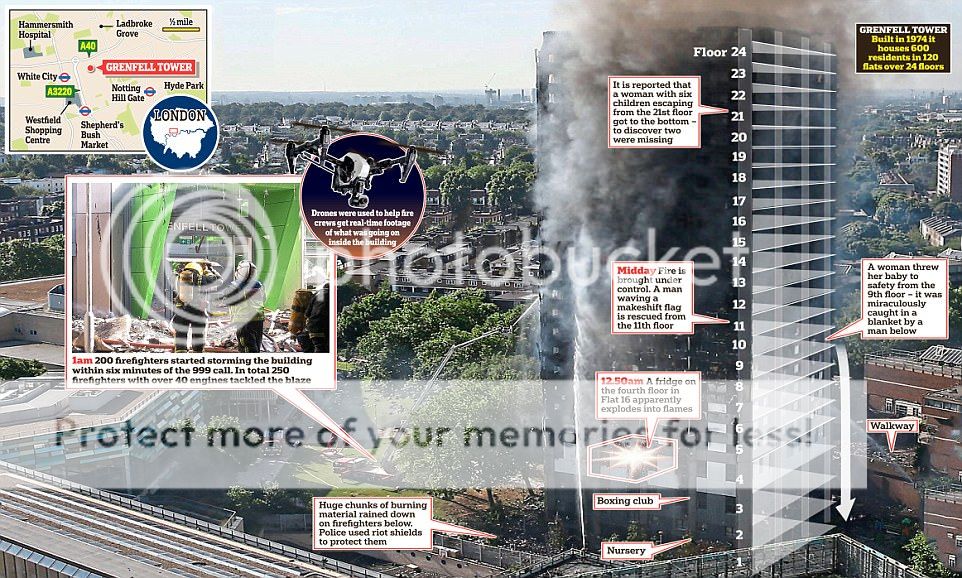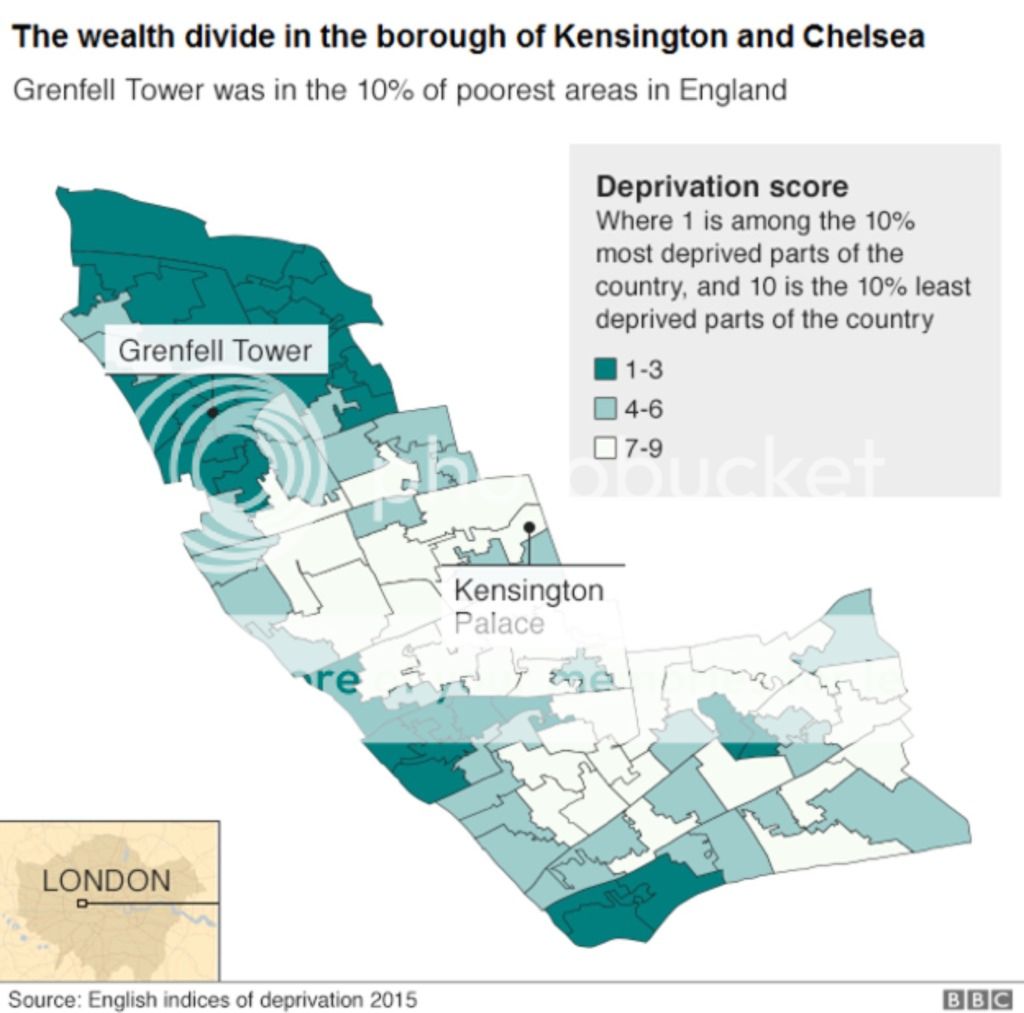- 16 Jun 2017 19:56
#14814996
The recent fire a few days ago of an apartment block is now a symbol of the inequality in the U.K. This fire in Kensington, London, is where the poor and the wealthy live side by side and the poor are housed in dangerous conditions. A house costs over a million pounds and the poor service the rich but can't afford to send their kids to nursery school.
The death toll will rise above a hundred because of a lack of sprinklers and substandard building improvements.
Is this acceptable in the twenty first century?
https://www.theguardian.com/commentisfr ... -high-rise
[Zag Note: Please stop changing the topic]

IF I HAD UNDERSTOOD THE SITUATION A BIT BETTER I SHOULD HAVE PROBABLY JOINED THE ANARCHISTSGeorge Orwell
The recent fire a few days ago of an apartment block is now a symbol of the inequality in the U.K. This fire in Kensington, London, is where the poor and the wealthy live side by side and the poor are housed in dangerous conditions. A house costs over a million pounds and the poor service the rich but can't afford to send their kids to nursery school.
The death toll will rise above a hundred because of a lack of sprinklers and substandard building improvements.
Is this acceptable in the twenty first century?
The appalling destruction of Grenfell Tower and the lives of so many who lived there has exposed what society, in its heart, already knows: our housing cannot continue to be subject to the market’s desires, needs or fluctuations. If some housing is regarded as being more valuable, more desirable, corners will always be cut in the places where there is less financial return. The same goes for people: the most disadvantaged always suffer most from the mistakes of the powerful.
In an inner-London borough as rich as Kensington and Chelsea, social housing is at once integral – in that it forms a massive proportion of its housing stock, and houses a large number of its working residents and families – and yet invisible. This means tenants could warn, repeatedly and with escalating fear, that the building they lived in was a death trap; it meant they felt harassed and intimidated by the landlord and subcontractors during the recent renovation; and it meant, ultimately, that they would be the victims of possibly criminal levels of neglect.
Grenfell Tower’s action group rightly regarded their social landlord and their local council as being in “sordid collusion” with each other to disregard the needs of tens of thousands of residents, in the knowledge that the only power the latter had was their collective anger – whereas their landlord could rely on the borough for political and legal clout. This power imbalance was amplified by the fact that residents could no longer seek legal aid since extensive cuts were made to the service.
Residents are not ignorant: they have to live in buildings like this one every day, hoping for the best in the knowledge that this home is the only one they have. Grenfell Tower’s tenants may not have been experts in architectural cladding – who is, apart from the people you entrust with the safety of your home? – but they were well aware that their building didn’t have an adequate fire-alarm system or procedure for evacuation in the event of a serious fire.
I don’t doubt the current government’s involvement in this disaster, if only by implication through its reluctance to update and enforce building regulations, and its insistence on starving local authorities to the bone. The relentless enforcement of austerity as an ideology has meant that all councils now feel it is their job to spend as little as possible. This includes the borough of Kensington and Chelsea, which, according to Kensington’s new Labour MP, and housing campaigner, Emma Dent Coad, has a £300m contingency fund.
However, the previous Labour government was complicit in applying the market to social assets. Not only that, it refused to counter the Thatcherite narrative that social housing and tenants were inherently problematic in a “property-owning democracy”.
Tony Blair made a point of visiting the Aylesbury, a massive south London estate, when Labour was first elected in 1997, to launch its crackdown on crime and antisocial behaviour. Although the party instigated the decent homes standard, under which the majority of social housing was modernised and refurbished between 2000 and 2010, most estates were only improved once residents had agreed to have their housing stock transferred from local authority control to a housing association or other registered social landlord. These new landlords could lever huge private grants and loans to carry out the work, while local authorities could not. Tenants and leaseholders mostly voted for stock transfer knowing it was the only way their homes would be improved.
Many Labour-run councils, especially in London where land values are highest, are continuing to threaten social housing by pushing for full-scale demolition of estates that could instead be refurbished. The line is always the same – “There is no alternative” – even when campaigners on estates such as Central Hill and Cressingham Gardens, in south London, have drawn up detailed plans showing how their estates could be refurbished at lower cost and without forcing people to move.
When such plans get rejected by the council, you have to wonder what ulterior motives are at play. Inner London council estates are, after all, situated on prime land. Social housing tenants and leaseholders across London are starting to feel ever more insecure with each redevelopment that squashes their living space (refurbished estates often include extra flats for sale on the open market, to “pay for” social rented homes), or, worse still, leads to forced eviction to other places and the loss of all local ties.
Tower blocks are generally held to be the least popular form of housing, particularly for people raising families. Wide-eyed postwar council leaders, often in cahoots with private contractors who sold them high-rises on the basis of novelty and ease of construction, didn’t foresee the difficulty and expense of maintaining the blocks. After the Ronan Point disaster in 1968, when four people were killed after a gas explosion destroyed one side of a newly built tower block in east London, their reputation diminished further, causing people on the waiting lists to refuse them.
But that’s not to say other people don’t enjoy living there, for the astonishing views, and for their self-contained nature – which in the most successful cases creates a tight-knit community.
Problems mostly arise when housing managers fail to keep on top of repairs, safety issues, residents’ complaints and other bugbears, such as blocked bin chutes and noisy neighbours. On-site caretakers, when landlords decide they can afford to employ them, solve many of these issues. What they can’t change is the wider snobbery that has come to infect the public perception of high-rise blocks. The social makeup of Grenfell Tower revealed clearly where the combined effects of class and race inequality meet. The geographer Danny Dorling has shown that black and minority ethnic people in social housing are disproportionately housed in flats, to the extent that most black children in London and Birmingham are housed above the sixth floor. This is not to do with a shortage of housing, but is a reflection of the fact that not only are ethnic minorities more likely to be working-class by wage and occupation, but they experience discrimination – tacit or outright – when allocated housing.
Yet not everyone who lives in tower blocks is poor: since the advent of right-to-buy, many professionals – particularly in the capital, where affordable housing is at a severe premium – have become private tenants on council estates. It’s the perception of social housing, particularly high-rise , as being “for poor people” that leads to the maltreatment of residents, regardless of their class or income. If poverty is an individual moral failing, as has been relentlessly argued by those in power for nearly 40 years, then anything associated with poverty must also be a sign of second-class status. Jeremy Corbyn and other Labour MPs are right to call for the requisition of empty homes in Kensington to rehouse locally those made homeless by the fire: such action would be a test of the government’s, and Kensington’s, willingness to acknowledge the extent of housing inequality.
Grenfell has to be the point where we recognise collectively the criminally destructive effects of Britain’s class inequality. When inequality is permitted to flourish, its effects bear down all the more on those at or near the bottom. The experience of material poverty is compounded by the assumption that you caused your own poverty through being stupid. The privileged can buy their safety, their security, their legal representation, and kid themselves that it’s because they’re clever and know the answers, so they don’t have to listen. Their wilful deafness has come to haunt them.
https://www.theguardian.com/commentisfr ... -high-rise
[Zag Note: Please stop changing the topic]

IF I HAD UNDERSTOOD THE SITUATION A BIT BETTER I SHOULD HAVE PROBABLY JOINED THE ANARCHISTSGeorge Orwell



















 - By annatar1914
- By annatar1914